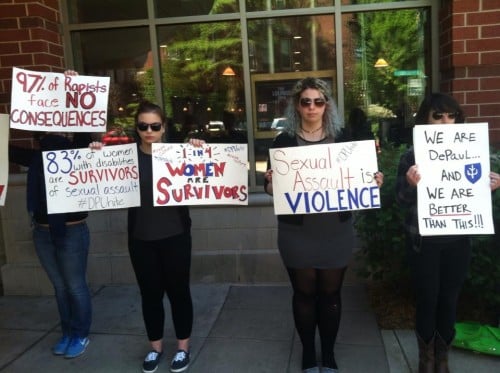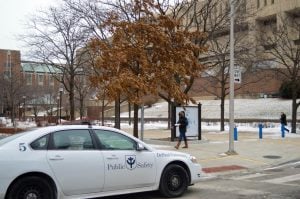
We know the statistics, we know the rumors, we know the rhetoric, but do we recognize the misconceptions?
Rape, sexual abuse and assault,relationship violence, domestic violence, and stalking have tragically become a part of our day-today vocabulary and garnered national attention. DePaul is no exception. Last year’s controversies and accusations against the Athletic Department and DePaul’s overall sexual assault and awareness policy became a defining moment for the university.
A dialogue surfaced, pitting the university on one side and the students on the other. This is not to say that all students were opposed to our university’s actions, but to suggest that for some the bottom line of safety became blurred with the excitement of protests and civil disobedience and an inherent effort to seek answers in the name of justice. While mistakes were made from both camps, it’s clear that this year will have to take on a different tone if we are to effectively work together towards making DePaula safe and comfortable environment.
Accusations against DePaul’s Athletic Department and the efforts of Public Safety produced questions about DePaul’s policies, disciplinary proceedings, campus rape culture, legality issues of compliance with state and federal laws, and an overall concern of a certain lack of transparency and inclusion on the university’s part. The 2013-14 academic year ended with an overwhelming amount of frustration from both the university and students leaving the issue largely unresolved.
With the start of this academic year, DePaul has made changes that include a revised policy and new programs. But despite these efforts, why is there still a disconnect between students and the administration? Part of the answer is lack of awareness. While the Office of Health Promotion and Wellness and Public Safety have made leaps in updating policy and seriously addressing the needs of students, there seems to be a challenge in rebranding these university institutions after last year’s fallout.
There are two sides to this problem: the university must not only send out new initiatives to students through email, but understand that the students assume these initiatives are spurious in the first place. The university needs to recreate their image by starting with a direct message on the difference
between Public Safety and the police. Being explicit about the different jurisdictions of the two bodies will help to confront some of the confusion of last year and create a more honest environment.

On the flip side, students must challenge their preconceived notions of DePaul’s administration and Public Safety. Understanding the various cogs of the machine and reporting options in the fight to end rape culture and create a safe environment at DePaul is imperative.
To a certain degree, an amount of selective perception begins to happen from all sides of the issue: it’s hard to trust the administration after hearing stories, true or false, about its inconsistencies; it’s hard to trust the police with their seemingly intimidating legal jargon and their lengthy investigations; it’s hard to trust Public Safety when they are employed by a university that realizes its reputation is at stake; and on the flipside, it’s hard for the administration to understand what the students of this university are going through in a time where sexual assault and awareness have become a national crisis.
If the administration can understand the reality of the remnants of the negative reputation left over from last year and focus on rebranding themselves, and the student body can recognize the university’s attempts for improvement and keep an open mind, then our university will truly have a chance at working together to combat the problem of sexual assault and awareness.
In order to help clear the misconceptions, it’s crucial to establish the difference between DePaul Public Safety and the Chicago Police Department (CPD). Rima Shah, DePaul’s sexual health and violence prevention specialist, helps train Public Safety officers.
Public Safety’s role is to get down whatever the survivor wants to share, make sure the survivor gets the resources available and then pass this information on to the Title IX Coordinator in the Dean of Students office, Shah said. Public Safety does not investigate these types of cases.
“(Public Safety) is basically the conduits to get the student resources to make sure that this case gets to the Title IX Coordinator, who then does the investigating, or to get this case to the CPD if the survivor so chooses,” Shah said.
Students need to realize that in the event of a sexual assault they have many options available to them. “All the control is in the hands of the survivor and whatever they want the process to look like,” Director of Public Safety Bob Wachowski said.
After the Title IX Coordinator, currently Cindy Summers investigates the individual’s case, it then moves to a judicial hearing, according to the student conduct code. “The important thing to remember with the student conduct process is that it’s not like criminal law where it has to be beyond reasonable doubt,” Wachowski said.
Going through Public Safety and the university code of student conduct is an option survivors can choose if they wish to remain anonymous and do not want to press charges. The result is that the sanctions falls into the hands of the university rather than a court of law. A survivor may choose this option for a number of reasons: the process is considered faster than waiting on a trial date, the survivor may not want the perpetrator to face harsh legal consequences and going to the police can be very intimidating.
When the survivor knows the perpetrator, it adds another level of complexity to the situation. The reality of the situation is that approximately two-thirds of assaults are committed by someone known to the victim and 60 percent of sexual assaults are not reported to the police according to the Rape, Abuse and Incest National Network. In essence, the idea of a serial rapist hiding in the back of an ally doesn’t apply to the majority of cases.
The university’s sanctions only apply to the university setting, i.e. moving the perpetrator to a different residence hall or a different class, or in extreme cases, expelling the student. Reporting through the CPD can lead to more severe consequences for the perpetrator should the case move to trial. It’s important to understand a common misconception about the CPD and anonymity here.
Josh Wietzman, an instructor at Chicago’s Finest Tactics and CCL, an organization that creates awareness about sexual assault and safety, said, “Your name won’t be in the press, they don’t put victims names in the press. But once court comes you can no longer be anonymous because you’re the victim.” Wietzman and fellow instructor Jack Shilney both advise calling the police first if you are ever sexually assaulted.
“We’ve been seeing that campuses and universities can kind of try and push things under the rugs because they are very concerned with the statistics of their school,” Wietzman said. “I’m not trying to disparage campus police by any means, but they work for the university, they don’t work for the city, they don’t work for the municipality.”
Shilney also addressed this concern in light of student athlete accusations, stating, “Say I am an athlete and I punch you in the face and then rob you. If I am campus security, I might classify this as just a robbery. It’s really about funding and a school’s name.”
While Wietzman and Shilney are not specifically referring to DePaul, they believe it’s important to draw attention to this nation-wide problem. Surely, this is not to suggest or imply that DePaul Public Safety officers suppress assault claims, but to alert the student body of this national concern.
As Wachowski and Shah said, DePaul Public Safety cannot investigate the matter and also cannot ask probing questions with survivors of sexual assault. There is an illusion on campus that Public Safety should be doing more. This belief is partly enforced by their visibility around campus. Because of their resemblance to the police in appearance (i.e. uniform), we assume that they have the same powers as the police. This misconception is imperative to recognize.
It’s important to be correctly informed on the powers of the police versus the powers of Public Safety when reporting any type of crime ranging from theft to sexual assault. This is not to say that each institutions’ motives are different due to their relation to the bodies that employ them, but to draw attention to how the individual’s choice of reporting can affect the outcome and consequences of the situation. Although there are sure to be survivors that have had both positive and negative experiences with the police, if a survivor wants consequences for the perpetrator that are larger than the university and a more intensive and professional investigation, going to the police is an option.
My intention is not to paint a picture of right and wrong or good and bad. My intention is to create awareness of the groups involved in the hope that together we can create valid solutions, and survivors can be correctly informed of each process when choosing whom to report their case to.
While I cannot speak from the voice of a survivor, a perpetrator, a Public Safety officer, a Chicago Police officer, or a DePaul administration member, I can speak from the voice of a concerned individual who wishes to shed light on a complex topic that is harboring a lot of animosity from all sides.
As students, we cannot be surprised if Public Safety doesn’t deliver in the way that we expect them to, when the administration doesn’t conduct a police investigation, or when the police introduce legal consequences and the process becomes much more involved.
The reality of the situation is that heinous crimes of sexual assault are rampant. While preventing them is a whole different problem in itself, it’s important to be informed of the options available and their various outcomes.
There is no excuse for the university to not clarify the roles of the different resources available and in turn, there is no excuse for the student body to be unaware of what to do in the face of crime.
Being educated is a key component in the fight to end sexual assault and can be a perfect starting point in the effort to create a safer and more honest environment at DePaul. However, this will only work if each side is willing to come together, acknowledging last year’s controversies and missteps, while also realizing the potential they have to accomplish great things, together.
